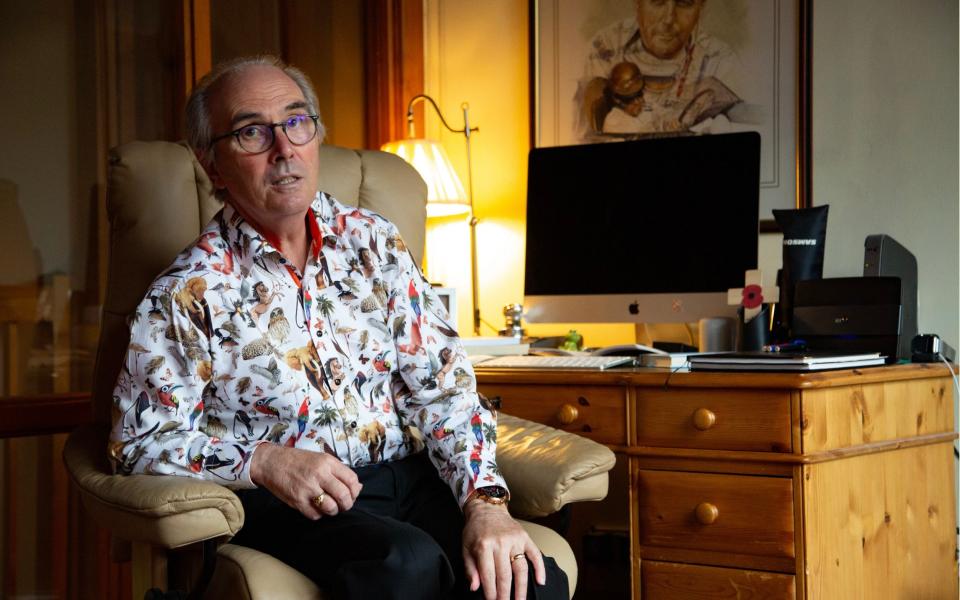Exclusive interview: Inside the mind of George Ford, where visualisation and MP3s give him the edge

It is the calm before the storm. In the hours before the cacophony and chaos of an East Midlands derby between Northampton and Leicester on Saturday, George Ford will lock himself away in a quiet room for 20 minutes to listen to an MP3 specially recorded by his mind coach Don Macpherson.
The first five minutes will focus on being present and controlling his breathing. Then Ford will spend 15 minutes visualising what he calls the “best version of himself” against Northampton. This will include detailed descriptions of the feeling of the dimples of the ball in his hand, the weight of his feet on the grass and even the individual catcalls from the crowd at a sold-out Franklin’s Gardens.
And then the Leicester fly-half will play out the game in his head when he inhabits that sacred zone or flow sought by athletes of all sports, where everything comes naturally, all kicks sail between the posts and every fizzing pass sticks. This season the reality has not been too different to the ideal. Ford has played immaculately for table-toppers Leicester, enjoying arguably the best form of his storied career, even if he suddenly finds himself out of favour with England head coach Eddie Jones.
The best version of Ford also has the freedom to play the game as he sees it without the twin inhibitions of fearing failure or following a tactical template. Having made his professional debut as a 16-year-old, Ford has to cast his mind back to when he was nine playing for Saddleworth Rangers to recall this sense of liberation.
“As you go through your career, you have a lot of experiences, you learn things, you get coached, people give you feedback constantly and before you know it you lose that feel, that awareness, that instinctiveness of when you were a kid,” Ford told Telegraph Sport. “It sounds a bit weird but I work on getting that back into my game.
“When you are in that zone, you have a lot more feel, a lot more instinctiveness. A lot of things happens when you didn’t even consciously think about it, you just did it. It is all about being a kid again. You get all these experiences and that can get knocked out of you. That’s where my work with Don has helped so much. The tools he has given me have helped me massively as a player on a field.”
Macpherson has worked with Wimbledon champions such as Pat Cash, Ryder Cup golfers, F1 drivers and dozens of rugby players. Most are received on the upper floor of a converted barn in Bathampton, on the outskirts of Bath, by Macpherson, typically wearing a shirt at the far reaches of eccentricity, and his toy monkey, representing the mind’s tendency to wander aimlessly from tree to tree.
Once a relationship is established, Macpherson will record custom-made MP3s – a format which technically died in 2017 – for his clients. In Ford’s case, these tend to be for big games such as the derby and he will typically listen to it three times in a week. “When it got to a game at the weekend, it felt like I have already been there,” Ford said. “Ever since then, I started using MP3s consistently throughout my career to be half a step ahead by the time the weekend comes.”
The MP3s rely on Ford’s input. The best version of Ford is always evolving. “You can visualise and work out how you want to feel as a player but then maybe 4-6 weeks that’s changed again because you will have experienced something different,” Ford said. “It is about getting better and developing.”
Often it will be centred around targeting incremental improvements in his game. Sam Burgess, when he was in union, focused his visualisation on rolling away from the tackle. For Ford, his improvements tend to be focused on far smaller modifications in his technique, say around drop-goal kicking. His appetite for development is voracious.
“I don’t think I have ever worked with anyone in any sport who works harder to tune his brain than George Ford does, so he knows he has done everything he can to be his best,” Macpherson said. “I choose my words very carefully here, but his rugby brain is the best I have ever worked with.”
It is a paradox that fly-halves are the team’s chief decision-maker and yet they have so little time to think, especially when you play as flat to the line as Ford does. This is what Ford says makes his visualisation so crucial, not to provide a premonition of what is to come but to rehearse those split-second choices.
“You are not actually predicting what is going to happen, but because you are thinking that way it makes me a lot sharper to respond to things,” Ford said. “Sometimes you do things on a field that you don’t have time to think about. When a big event happens in a game and you need to make a crucial decision or change the game tactically I felt I could think more clearly.”
There is a matador-like element to Ford’s game, where he almost teases the on-rushing defensive line. Few fly-halves in modern rugby are as adept at playing on the point of contact as Ford, which Macpherson compares to another high-risk sport.
“Ayrton Senna used to say that his brain was two-tenths of a second ahead of his body, so his brain was already at the next corner while his body was dealing with the corner he was already at,” said Macpherson, who was working in F1 at the time of Senna’s death in 1994. “I feel George has that Formula 1 brain where he sees and computes actions very quickly, far faster than most tens I have worked with.”

From his work with sporting champions and neurosurgeons, Macpherson has created what he calls a menu of brain-tuning tools which he shares in his book, How to Master Your Monkey Mind. “The book is a result of people like George telling me what works, what could be better and what doesn’t work,” Macpherson said. “There’s no doubt that I am a better mind coach from working with George. Arguably I have learnt more from him than he has from me.”
Another tool that Ford will deploy during lulls in a game is a Zen breathing technique which Macpherson says is necessary to “switch his brain off when play stops, so it is not over-revving all the time”. Then there is the constant battle to control the “monkey mind” or inner chatter that can easily become self-critical and overtly negative.
Ford’s startling omission from England’s autumn international squad could easily have ruined his equilibrium but instead the 28-year-old has not missed a beat. “The work I do with Don is always bringing you back to being grounded in the moment and dealing with things in a more rational way,” Ford said. “Every day I want to come in and try to get better as an individual and contribute to this team at Leicester. Why should that change because of what’s happening externally? It shouldn’t. You shouldn’t react to bad news or good news. You need to go about things in the same way. That’s my mindset.”

